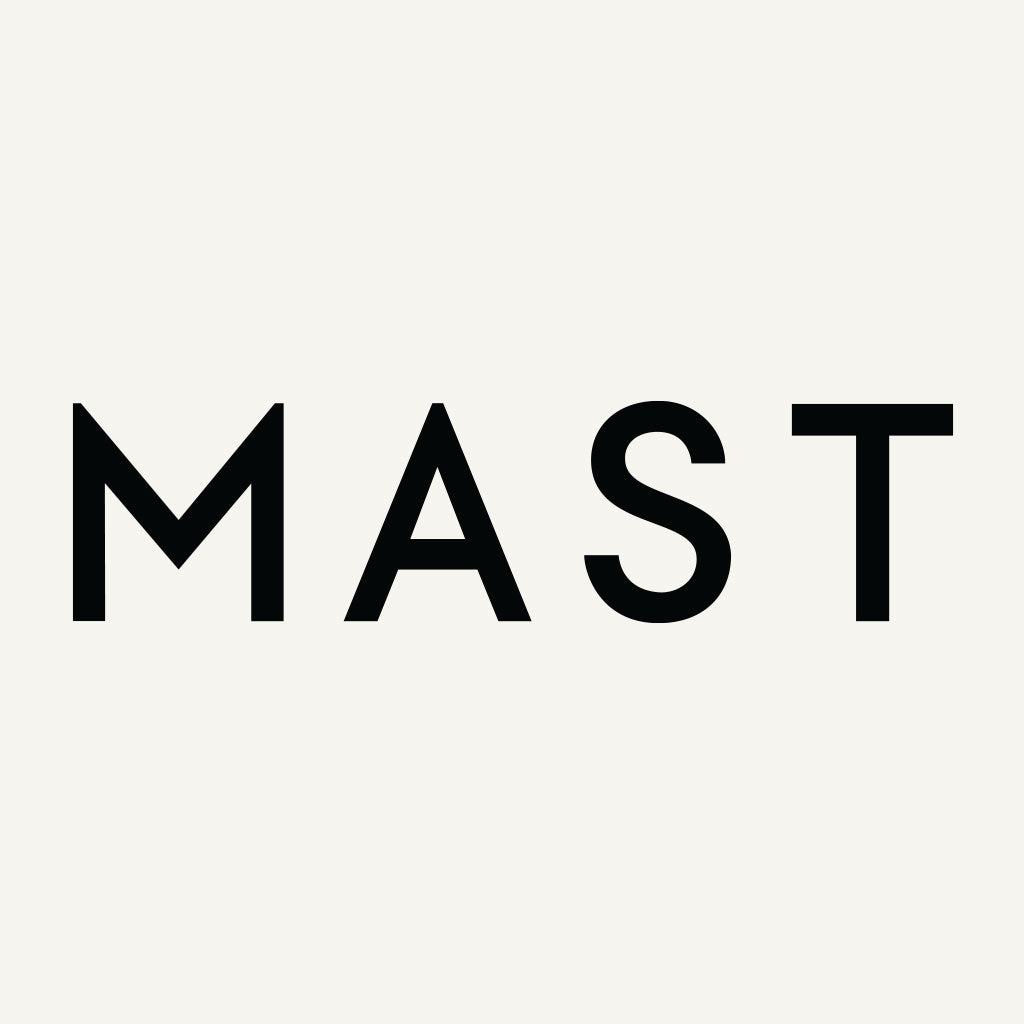Tara & Jeff Put Skin In The Game
In 2009, Tara Pelletier and Jeff Kurosaki started to make soap in their Brooklyn kitchen. It was the height of the borough's maker movement and the duo thought that crafting handmade bodycare products would provide easy income to support their performance art careers. They had no idea that their side hustle would turn into a successful vegan apothecary—but that’s exactly what happened.
Meow Meow Tweet, which is named for the couple’s two beloved cats and Jeff’s bird, is now a beloved skincare company that’s best known for its baking soda-free deodorants and colorful, whimsical aesthetic. Real fans of the brand also appreciate its full face, hair, and body collection, as well as its unwavering commitment to its values, of which there are many.
“We focus on low-waste packaging and circular systems of distribution, so we have a bulk container refill program,” explains Tara. “And our interests are in ethical sourcing, organic farming, and low-impact plants that have a relationship to the communities that they're grown in.” The company also manufactures in small batches to ensure the freshest, highest-quality products and is passionate about creating sustainable jobs for its employees.
Here, Tara talks more about Meow Meow Tweet’s evolution, values, and future.
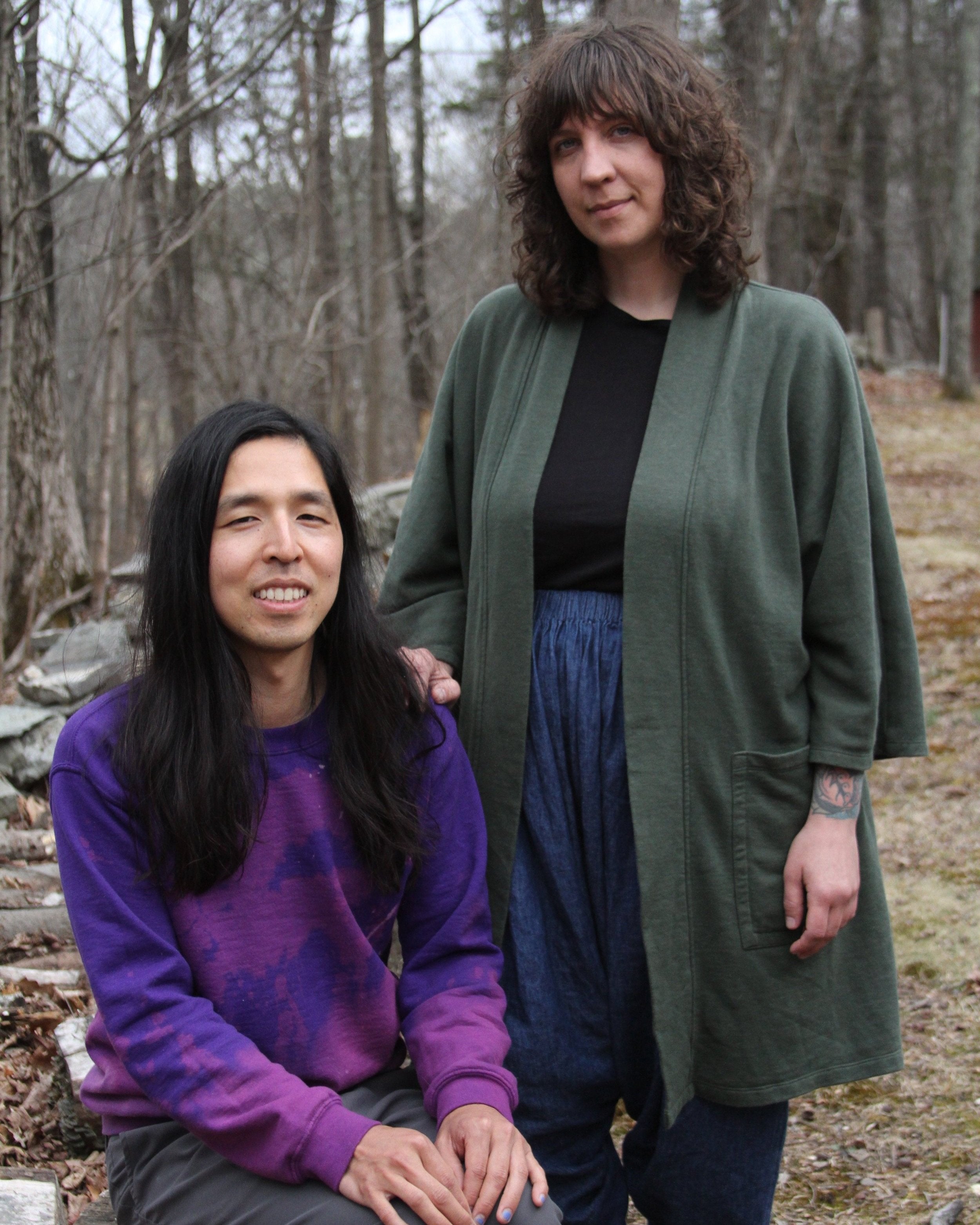
Mast Journal: How exactly did you start Meow Meow Tweet? Were you originally selling your products at flea markets like other Brooklyn makers during that time?
Tara Pelletier: Yeah, so much of our growth really was about hitting the pavement. There was this market in Brooklyn called the Vegan Shop-Up and we were one of the first companies that did it every month that it happened. We also did the Brooklyn Flea and a lot of popups and slowly started getting our products into independent boutiques and lifestyle stores.
MJ: Is that where Meow Meow Tweet is primarily sold now? In small concept shops?
TP: We're mostly doing direct-to-consumer and we still have a pretty significant list of independent boutiques that carry us across North America. Our business changed a lot during the pandemic. Before the pandemic, 75 percent of our business was through wholesale, so through small stores. And we were carried in a couple big box stores for a bit. When the pandemic hit, our direct-to-consumer business grew and we invested more of our attention in it. And many of our beloved stores closed. That indie store business fell quite a bit. It's just the unfortunate reality—it wasn't a purposeful redirection, but a circumstantial thing that a lot of businesses probably experienced.
MJ: That seemed to be a trend for a lot of brands. What is your core product line now?
TP: The product that we're most known for is our deodorant. It popped off when we created this baking soda-free deodorant cream in 2012. At the time, natural deodorants were just starting to hit in terms of becoming something that a broader range of people were interested in. And ours was specifically targeted for sensitive skin that would get rashy from the baking soda deodorants that were on the market, which were natural but were a little more harsh.
Later, we launched our paper tube deodorant, which was the first paper tube deodorant on the market. I feel so silly saying that sometimes, but there's so much unseen work that happened to make our paper tube deodorant successful. And now there are so many paper tube deodorants on the market. But I remember getting customer emails that were like, Why can't you just put this in plastic? I can't retract it. It's starting to get oil stained. And now people are like, Ooh, it's getting oil stains. That means it really is biodegradable. The market demands have changed and people actually are caring more about sustainability and whether their packaging exists way beyond their lifetime.
We also have a full line of facial care that is all refillable. There's a closed loop system to the refill program, where you can buy a toner in a full size bottle, fall in love with it, then buy a larger refill bottle that's about four times the size to refill your original bottle. Then you send the empty bulk container back to us, and we clean it, sterilize it, put more product in it, and put it out for sale again. So through the existence of this bulk program, we’re keeping empty containers and pumps out of the waste stream.
MJ: That’s so impressive! How did you come up with the idea for paper tube deodorant? And for the refill program?
TP: Paper tubes already existed. There used to be these push pop ice creams. And then there was one brand that was doing a lip balm in a paper tube, Earth Tu Face, which is another really wonderful brand. I looked at their design and talked to their supplier because we are friends with Earth Tu Face, which is one of the wonderful things about being a small independent brand. Often you're just friendly and sharing information with one another. So I worked with their supplier on different modifications to the design that would work with this really powdery formula that the deodorant was. The deodorant formula is very different from a lip bulb formula in that it has a ton of powder.
In terms of the refill program, we can think about milk delivery programs from the 1950s. There was a company that Nestle had launched for a little while called Loop that was trying to do it. It didn't really take off, but having a closed loop refill program is definitely not original. But it’s also not super lucrative. You make a lot more money as a company if you get someone to buy a smaller size over and over. As you increase the size of something, the cost goes down for the consumer. And for the company, you're making less over the lifespan of having that customer. But our goals aren't money-driven first. We’re values-driven first and then we just cross our fingers and hope that we make money doing what we're doing.
MJ: That’s admirable! Do you find that people are really engaging in the refill program and sending their packaging back to you?
TP: Yes. We're in our fourth year of the refill program and what we've seen happen is that the numbers that we're selling for our full size products are going down, and our bulk numbers are slowly going up. But because they're larger sizes, they're not going to go up as quickly. And then we're also seeing a lot more loyal customer retention. So it's a little bit of a longer game in terms of growth for a company and slower than what is usually acceptable for a company under capitalism, but it's super thrilling to us. We're about to relaunch the bulk packaging and make it even easier to clean, which then means that we can lower the price for people a little bit more, which will make it more attractive, hopefully help it to grow, but also help people to invest in it for themselves.
MJ: It must be cool to see that you’re making a difference.
TP: It is cool to see a difference being made, even though we are small—we're not a big company and we probably will never be a big company and we're fine with that. But it's nice to possibly put a little bit of inspiration out into the world, too, so that maybe some bigger company can figure out some bananas way of making a closed loop refill program that's super lucrative and then that just becomes more mainstream.
MJ: That would be incredible. How did Meow Meow Tweet become a values-first company?
TP: That's a good question. We became a values-first company by default. My partner and I are just obsessed with how we exist in the world. We were vegan, so the company started being vegan. Veganism for us, and for most vegans, is political. We were also always just kind of anti-establishment as teenagers and then into our early adulthood. One of the people that I worked for before Meow Meow Tweet was an artist who was a self-proclaimed communist. And the way that he ran his work environment was so worker-first and so exciting. I had never experienced anything like that before and I remember saying, Oh, if we ever get employees, I'm going to do what he did.
It took us a while to be able to enact a lot of the things that we want to do. That's one of the most frustrating parts is having ideas and having values that you want to exist within the company, but then not having the actual capital means to make them happen. But there are ways of getting around that. I pretty proudly say that we've never had an unpaid intern. We've always paid well above minimum wage, and we've never hired unless we could afford to hire for the long term. That means we've worked ourselves into the ground to a certain extent, but we were able to slowly grow and bring people into the company in a really holistically sustainable way, a way that was good for everyone involved. Everyone being happy to come to work is a huge thing. Being able to support the lives that our employees want to live is really important.
MJ: That is huge! You’re walking the walk and talking the talk, even in aspects of the company that the customer can’t see.
TP: Yeah, I hope so. As a recovering perfectionist, I can definitely see every single thing that I would like us to be doing right now that we are unable to do right now. But I just try to remind myself that if we did it all right now, we wouldn't have anything to do tomorrow.
MJ: That’s a really nice perspective! How do your values show up in the products themselves?
TP: We've always been a little bit skeptical of business certifications because they're so expensive. And every time I look at the price tag of a certification, I think about how that could be a bonus for someone, or how we could buy this one ingredient that we've been eyeing for a new product. I think a lot about how that money could be reinvested in the community that we're in, but some of the certifications are important so that customers can feel trust. There are certain certifications that do so much due diligence or have measurable ways to show that we're doing what we're doing, and it does help someone to just quickly know, Okay, this is a company that I want to buy with.
MJ: Totally, if it has the organic seal, the shopper doesn’t have to do the research on the ingredients themselves.
TP: Exactly. One of the certifications that is really exciting is our plastic negative certification. Basically, we measure the amount of plastic that we use in our products and in the studio and then we pay to have twice as much plastic pulled from the environment through a very specific project. This one company that we do it through is called Repurposed Global. And they're becoming much more prevalent. They partner with specific plastic retrieval projects in various places in the world that have significant plastic waste and plastic pollution problems. And then they use that money to actually fund projects where the plastic is being taken out and disposed of or more recycled. So If we put one pump out into the world, we basically take two pumps worth of plastic out of the world.
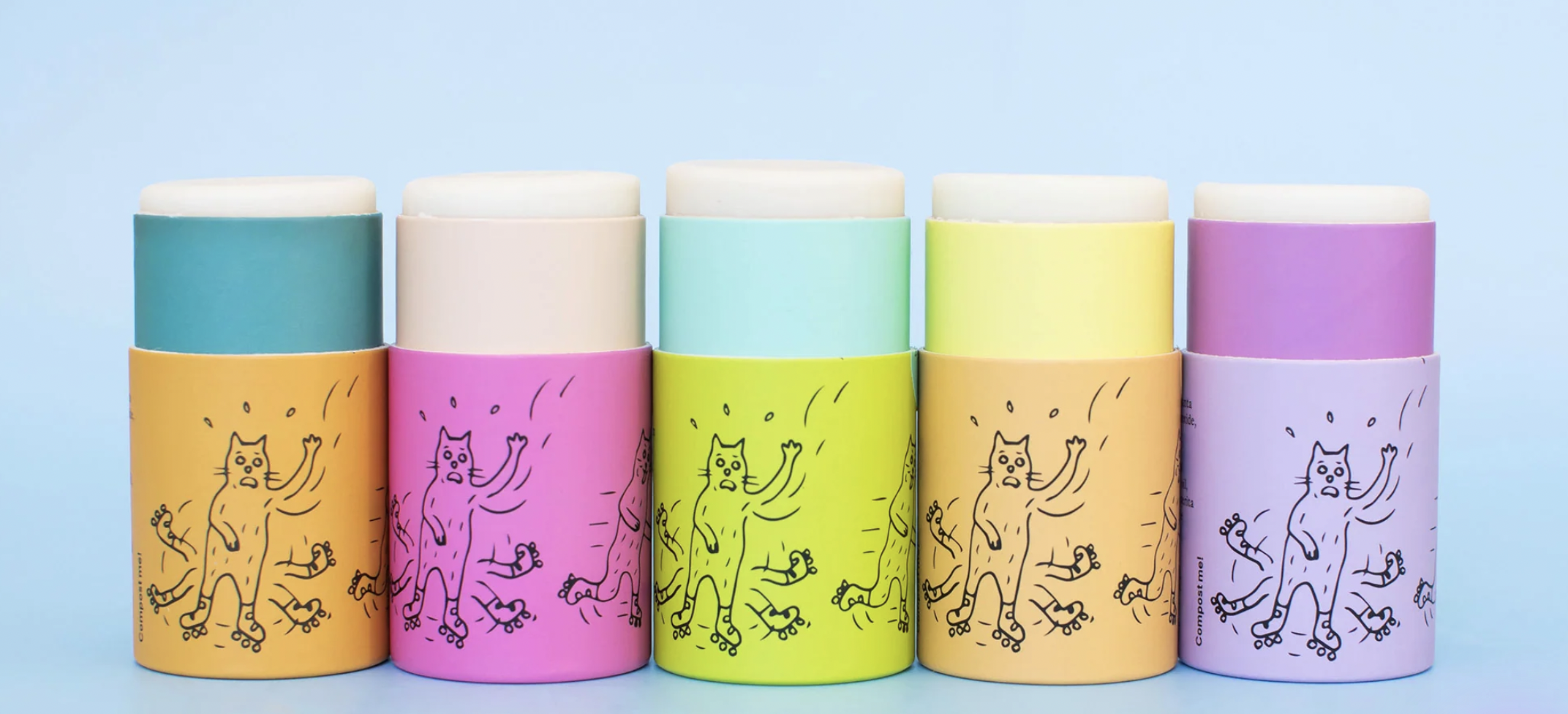
All natural, plastic-free deodorant sticks made with organic ingredients. Photo by Meow Meow Tweet
MJ: Wow, that’s great.
TP: We're also B Corp certified, and I think that's probably been the most rigorous certification process that we've undergone because it looks at every aspect of our business from the products that we put out to how we manufacture them, to how we source ingredients, and then also our company culture and structure. It has you prove everything that you say and then gives you a score and then you recertify every three years. So you're able to see how you can improve in those three years and work towards a higher score and see where you're doing really well and maybe where you're falling short a little bit. It’s an ongoing project.
MJ: Definitely. And how do you decide what ingredients to use?
TP: All of our ingredients are vegan and palm-free. I'm a certified aromatherapist and an herbalist, and my approach is to formulate as if I'm formulating for a child because I have sensitive skin and I also have a very sensitive nose. And I'm also just really excited about creating skincare for sensitive people. I was also a chef in my past life, so the combination of being a chef and wanting a specific scent and textural experience to all of the products dictates the ingredients a lot. It’s about how we want it to smell, how we want it to feel on your skin, and how we want it to soak in. And then also because my time coming up as a chef was during the start of the California slow food movement, I have this excitement about someone looking at the back of our packaging and being able to recognize every ingredient and it being just plants.
MJ: That’s amazing. And how did the name and the look of the brand come to be?
TP: The name Meow Meow Tweet came from the fact that when we started, we had two cats and a bird. I am not good at naming at all. Jeff is great at naming. And actually they suggested Meow Meow Tweet and I was like, No, that's ridiculous. There's no way that we're calling this company that. And then two days later I was like, Yes, Meow Meow Tweet. And the name has been a funny thing from the beginning. We've been told so many times that we're too cute. That was one of the biggest critiques when we were a newer company. And now it's a thing that we're known for.
All of the drawings on all of the packaging are also made by Jeff. So the look of the brand in terms of the drawings and the whimsy that exists is completely the responsibility of Jeff and their wonderful weirdo brain. And for a long time we worked with a designer named Sarah Haler, who is one of my good friends, and she was the person who made our logo. Sarah's responsible for all of the type choices, too. And then Sarah and I basically created the color palette together. The three of us would think of it as a collaboration. I would say that I'm a creative director, really just moving things along, but the drawings are definitely Jeff.
MJ: The aesthetic is so fun! Do you get more positive feedback on it now than you did in the beginning?
TP: We definitely get more positive feedback on the look of the brand now. And our skin is thicker. If you don't like it, go buy some minimalist things somewhere else. We are who we are. And luckily, now that we have enough sales to just sustain ourselves, we have the privilege to just be who we are.
MJ: You’ve got to own it! All beige everything is boring. And it’s great that you really commit to all your values.
TP: A lot of it has to do with privilege, but I'm glad that we also had the self possession to be able to just stay true and keep doing it. Because there were definitely times where we questioned what we were doing and whether we should keep on doing it. And now it definitely seems like it's just settled into it being cool and fine.
MJ: Totally. And what’s next for Meow Meow Tweet?
TP: I've been saying this for years, but we're going to open a brick and mortar. It will not only house our products and a refill station, but we'll have some other products from other brands that we really love. And then we'll also have an active calendar of workshops and community events and hopefully performances, so it'll be a gathering place as well.
More from The Journal
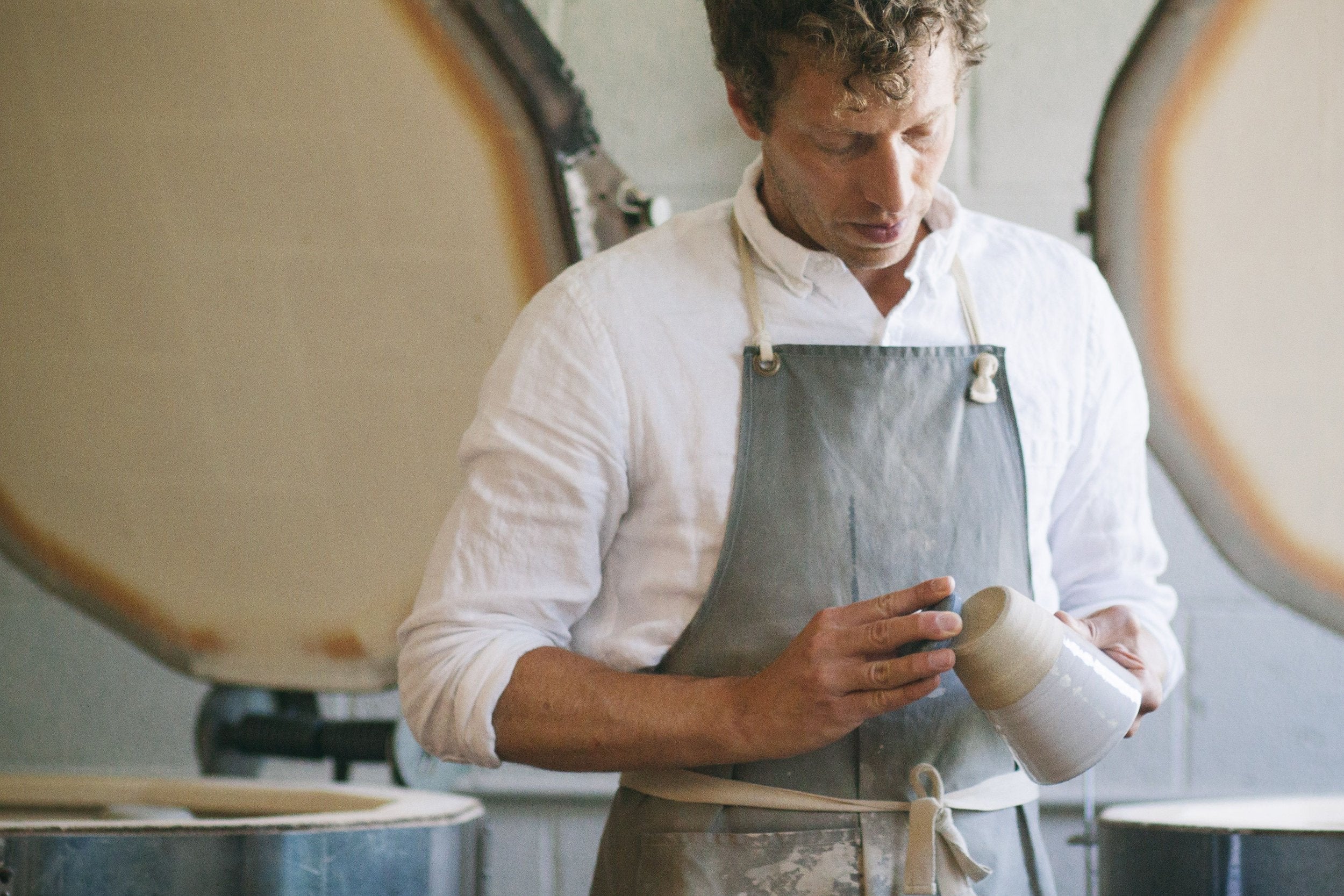
Turning the Wheel with James Zilian
Ceramicist James Zilian talks with the Journal about his path to starting Farmhouse Pottery and what is next for the beloved and trendsetting Vermont based studio.
Read more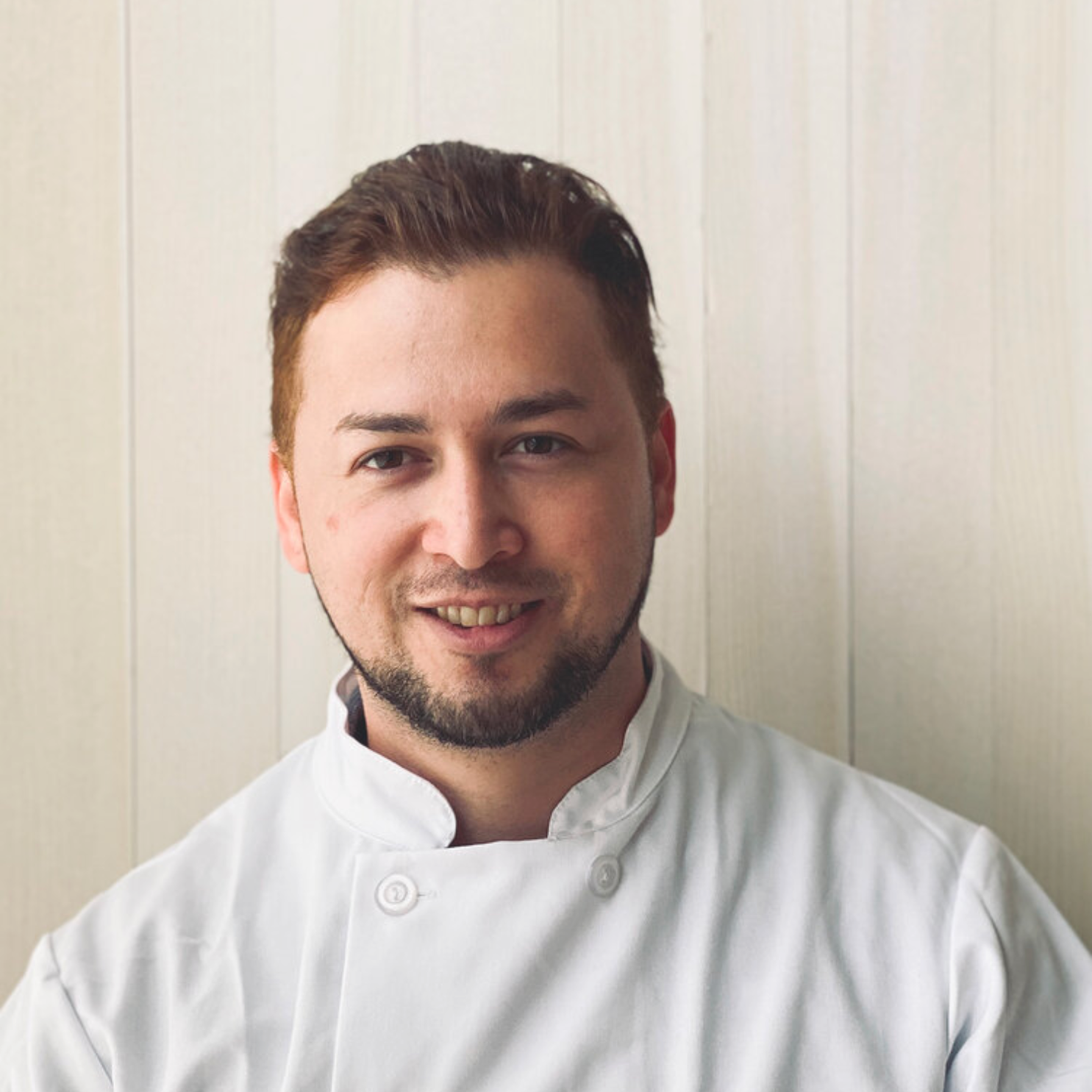
Meet the Maestro, Franco Andrade
Franco Andrade has come a long way. He opens up about the hardships of where he’s been and how he’s found his path as the Maestro of the makers at Mast.
Read more